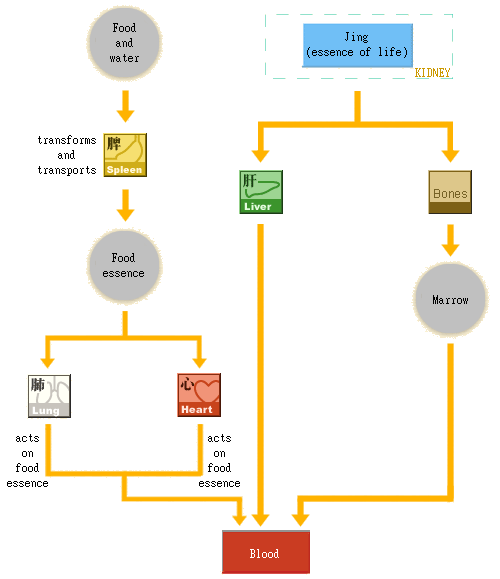Blood from a TCM Perspective
In western medicine, blood is composed of red blood cells, white blood cells, platelets, nutrients, other proteins, electrolytes and water. Its functions are based on the characteristics of these individual components. Some of these functions include distributing hormones, carrying oxygen and energy (glucose) and supporting the immune system.
Instead of studying things at a cellular level, TCM focuses on the body as a whole. Blood is viewed simply as the red fluid inside the blood vessels that provides nutrition for the body. The nutrients transported by blood are not restricted to physical materials. Its meaning can be extended to anything that provides nourishment to the body.
The origin of blood
Blood mainly originates from food essence and Jing (the essence of life associated with the growth and development of the body). First, digested food is turned into food essence by the stomach and spleen's transforming functions. It is then transported upwards by the spleen to the lungs where it turns into blood with the help of the heart and lungs. Eating a balanced and healthy diet is extremely important, because of the spleen's role in the production of qi and blood.
A second source of blood comes from Jing, which is stored in the kidneys. Jing travels to the bones where its turns into healthy and strong marrow. The marrow in turn produces the blood. Jing also goes to the liver to be transformed into clear blood.
The Functions of Blood
Blood is mainly responsible for nourishing and keeping the body moist. Internally, it circulates to the organs, and externally, it flows to skin, flesh, bones and muscles. Its detailed functions are as follows:
1. Providing nutrients for organs, tissues and meridians
With sufficient nourishment from the blood, organs and tissues can function normally resulting in a healthy glow in the skin, cheeks, and hair. Nails, muscles and bones also rely on blood nourishment to remain strong and healthy.
2. Maintaining healthy body movement and sensation
The Huang Di Nei Jing, a famous Chinese medicine text from the Han dynasty, says, "Having received sufficient blood, the liver can support healthy eyesight. Having received sufficient blood, feet can walk. Having received sufficient blood, the palm can grasp hold of things. Having received sufficient blood, the fingers can pick up things." This illustrates blood's importance in healthy muscle movement and sensation. If blood is deficient, dizziness, vertigo, ringing in the ears (tinnitus) or limb weakness can occur.
3. Aiding the mind and mental activities
A good blood supply is also important for mental health. With sufficient blood nourishment, a clear mind, good spirit, fast thought processes and swift reaction times are possible. On the other hand, deficiency of blood leads to poor memory and insomnia and in serious cases causes mental disorders and psychiatric diseases.
| Flow chart for formation of Blood |
 |
|
|